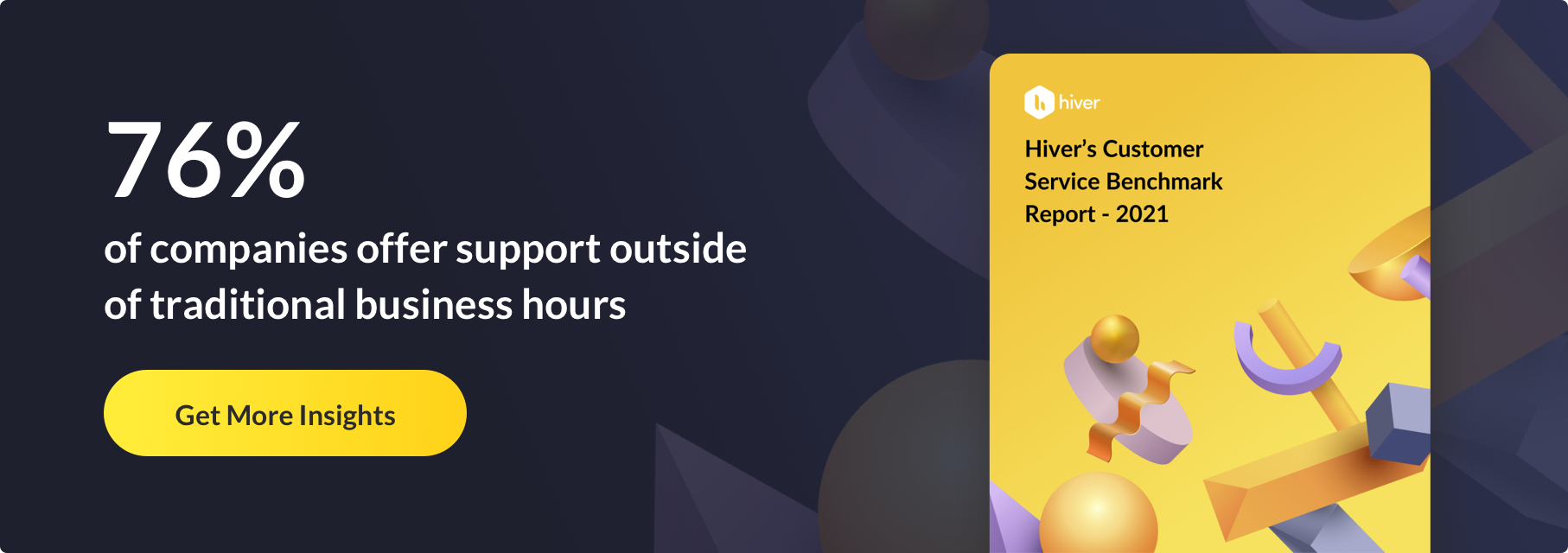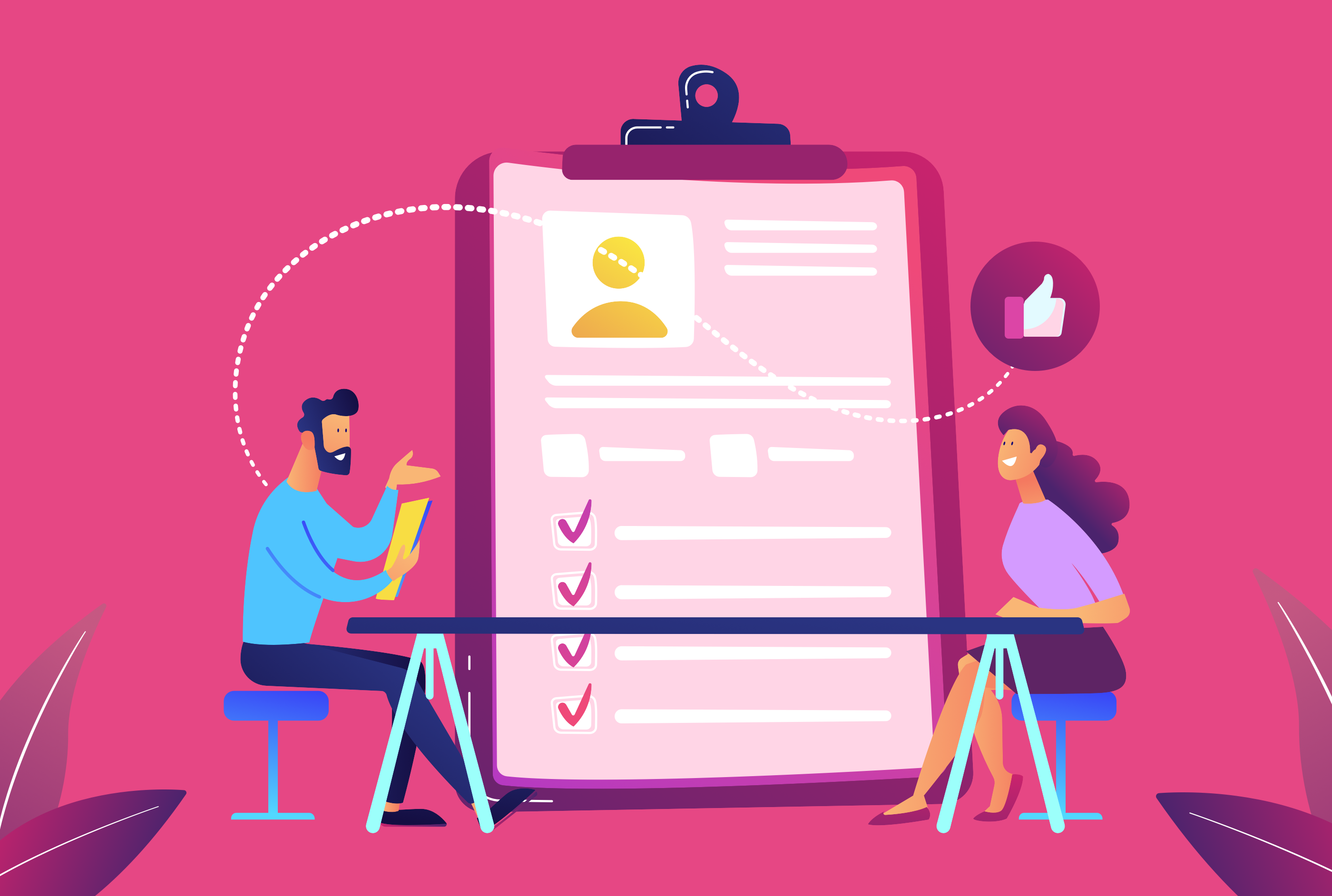“I absolutely love giving job interviews!”… said nobody ever!
Whether you’re a customer service newbie or a veteran, you’ll agree that interviewing for a new job can be a daunting experience. You have limited time to create an impression by giving your interviewer well-thought-out answers, asking the right questions, and coming across as friendly and empathetic. And, if that wasn’t enough work already, you also now have to keep in mind the appropriate etiquette for a virtual customer service job interview.
Seems a tad overwhelming, doesn’t it? For some of you, perhaps more than the others. But, regardless of how confident (or anxious) you are about the interview, nothing can make up for solid planning and preparation.
Before you start preparing for the interview, you must know you’ve already made a great first impression – it’s the reason you’ve been asked to interview for the role. Utilizing a resume builder can help ensure your application stands out and showcases your skills effectively. Your interviewer is hoping to be convinced by you, and the following tips can help you do just that in the best way possible!
Let’s unpack the top customer service skills interviewers look out for, some common customer service interview questions and answers, and tips that will help you ace that interview!
Table of Contents
- Skills to demonstrate in a customer service job interview
- Common customer service interview questions and how to answer them
- Tips to keep in mind during your customer service job interview
- Conclusion
Skills to demonstrate in a customer service job interview
Before jumping into the interview questions and tips, let’s spend some time discussing the skills hiring managers look for in potential candidates. To be able to excel at the interview (and eventually your job), possessing and demonstrating the following skills is crucial:
Empathy
One of the most important customer service skills is empathy – your ability to establish an emotional connection with customers and truly understand their needs, pain points, and expectations. As a customer service rep, you’ll often find yourself dealing with difficult customers, trying to solve their issues. Empathizing with them allows you to put yourself in your customers’ shoes and offer solutions that are in their best interests, not yours.
The digital transformation of customer service has helped organizations a great deal in streamlining and improving their workflows and processes. However, rapid digitization often comes at the risk of making customer service impersonal. Businesses are therefore increasingly focussed on adopting tools that can help them deliver personalized experiences to customers and hiring candidates with high levels of empathy.

Problem-solving abilities
A customer service role isn’t one without challenges. Not all customer issues and requests have straightforward and simple solutions, but they all do have strict response deadlines. Therefore, being able to think on one’s feet and respond to all customer queries with the most suitable solutions quickly and effectively is an essential customer service skill.
If you are a seasoned customer service candidate, you may have fine-tuned your problem-solving skills on the job. However, even if you’re someone who’s just starting out in the industry, you should go out of your way to demonstrate sharp problem-solving skills to your interviewer. Your ability to devise effective solutions and act upon them quickly can give you an edge over the other candidates.
Communication skills
We’ve all had frustrating customer service experiences. Oftentimes, it’s because we feel like we’re not being heard and understood or because the customer service representative is being vague and ambiguous with their responses. Poor communication or miscommunication can lead to confusion and in turn, customer dissatisfaction.
Being able to communicate with clarity and brevity is an indispensable quality you must have as a customer service representative. In addition to demonstrating your ability to respond to customers clearly and politely, you must also highlight that you can understand the customer’s point of view effectively. Communication is never effective if it’s one-sided.
Patience
In any customer service role, exhibiting a great deal of patience is an absolute must. Whether it’s an angry customer, an internal conflict, or a system failure, patience is the one quality that’ll help you deal with the toughest of situations with composure.
It’s not enough that you bring your A-game when things are going well – employers want to see how well you perform when you’re put under stressful situations. Patience can help you remain unperturbed and deliver consistent customer service, each time.
Recommended Reading

Attention to detail
What differentiates good customer service from exceptional customer service? The former is about meeting customer expectations, and the latter, about surpassing them. And, what is the key to surpassing customer expectations? Paying attention to every little detail about every customer, and surprising them with high-quality, tailored customer service.
Sure thing, your submitted job application based on an ATS resume template shows that you pay attention to every little detail. But those are just words. During your customer service job interview, you need to prove this claim by paying extreme attention to the minute details your interviewer shares with you
Bring up some of those pointers during the course of your interview and use them to highlight instances of superior customer service. This will give the interviewer confidence in your ability to pick up on important cues from customer conversations and leverage them to offer delightful customer experiences.
Collaboration skills
Delivering great customer service takes a village! Troubleshooting customer issues often require inputs from multiple team members. More often than not, it also involves effective collaboration across other departments. It may require inputs from engineering, sales, and sometimes, even marketing.
Employers, therefore, look for candidates who are team players and can enhance the efficiency as well as the quality of customer service with their excellent collaboration skills.
There are many software and tools that can make collaboration between teams easier. Your knowledge and awareness of those can also help you make an impression during the interview.
Multitasking abilities
Customer service is a fast-paced, high-pressure function, and customer service representatives often have to take up multiple tasks at once – in smaller organizations, even more so. You must therefore be comfortable multitasking without getting flustered.
Multitasking, no matter how important to a customer service role, can sometimes result in instances of error and inefficiency. During the interview, illustrate how you’ve been able to multitask effectively in your previous jobs. Demonstrate your process with clear and engaging examples.

Knowledge about the role, product, and the company
The aforementioned skills apply to all customer service jobs across different industries. But, if you want to excel at your interview, merely demonstrating or adding these qualities to your customer service resume alone won’t cut it. You must be equally equipped with the knowledge of the particular role you’re applying for, the product you’re looking to service, and the company you’re hoping to join. When you demonstrate prior subject-matter knowledge and expertise to your interviewer, it gives them the assurance that you’ll be an asset to their team.
Although it’s impossible to know everything about the role, the product, and the company before joining the job, what’s important is that you do thorough research and try to go into the depth of what the role demands. Employers appreciate it when you make that effort to understand what their product does and illustrate how you can service it better than other competing candidates.

Common customer service interview questions and how to answer them
Now that we’re clear on the skills you should demonstrate in your customer service interview, let’s go over the next important bit – the job interview questions. Preparing for different types of questions in advance can help you craft memorable and intelligent responses to them. It can help you stay calm, ramble less, and demonstrate a nuanced understanding of customer service to your prospective employer.
Following are some questions and how you can answer them best:
Q. Why do you want to work in customer service?
Who this question is for – Recent graduates; candidates looking for a career change.
What employers are looking for in your answer – This is a fairly basic question that most, if not all employers will ask for entry-level customer service positions. It is to assess your interest in the role, and the aptitude and skills you have for it. It can also help interviewers gauge your long-term career goals.
How you should respond to this question – Your answer to this question should highlight the fact that helping customers find solutions to their issues motivates you. It should demonstrate your great communication and problem-solving skills along with your ability to empathize with customers’ needs.
Q. Tell us about your customer service work experience.
Who this question is for – Experienced customer service candidates.
What employers are looking for in your answer – With this question, interviewers want to know details about your prior work experience relevant to the role you’re applying to. They’re looking to understand how you can add value to the role with your past customer service experience and the skills and knowledge you possess.
How you should respond to this question – Answer this question by explaining what your previous customer service roles entailed. Give specific real-life examples of brilliant customer experiences that stood out in your previous jobs. Describe your strengths, the key skills you acquired, and the fresh perspective you’ll be able to bring to the role.
Q. Give us an example of a time you dealt with a problematic customer.
Who this question is for – Experienced customer service candidates.
What employers are looking for in your answer – This behavioral interview question is to help interviewers gauge two important things – how well you were able to empathize with the customer’s problem and how you turned their negative experience around with your solution. They want to understand if you have a process of dealing with difficult situations and demanding customers and how effective that process is in a practical scenario.
How you should respond to this question – Answer this question by using the STAR method (situation, task, action, result). First, explain what made the customer unhappy/angry. Then, go on to describe the conflict resolution process you used – the tone and the phrases you used, the details you asked the customer to share, how you reassured the customer, etc. Finally, explain how you resolved the problem and how the customer responded.
Pro tip – If possible, share examples where you were able to turn a negative customer experience into a positive one.
Q. How would you describe an ideal customer service experience?
Who this question is for – Both experienced and inexperienced customer service candidates.
What employers are looking for in your answer – With this question, interviewers want to assess what excellent customer service means to you. They want to know whether your understanding of what qualifies as great customer service aligns with that of their organization.
How you should respond to this question – The best way to start your answer to this question is with an example. Give an example of a customer service interaction you handled or share a memorable customer service experience you had with a brand. After that, point out specific qualities from that example (such as great listening skills, proactiveness, etc.) that according to you made the customer service experience a delightful one. Be prepared to answer any situation-based follow-up questions.
Q. How well do you know and understand our product/service?
Who this question is for – Both experienced and inexperienced customer service candidates.
What employers are looking for in your answer – This question is for interviewers to ascertain how well-prepared you are for the interview and how serious you are about landing the job. It can also give them an idea about the particular things of the company’s product/service that stood out to you and further understand where your interests and strengths lie.
How you should respond to this question – To answer this question to the best of your abilities, ensure you do your research about the company well. Go through the company’s website and social media pages, take the product/service demo, and read multiple case studies and customer reviews about the product/service. Be specific while talking about the product/service and relate it back to your research. For example, while talking about a particular product feature, also highlight the multiple customer reviews that spoke about the usefulness of the feature. Based on your research, you could also suggest possible improvements in the product/service.
Q. What were your biggest concerns about the products/services you previously supported?
Who this question is for – Experienced customer service candidates.
What employers are looking for in your answer – This question is to help interviewers understand how honest you are with regard to your work. They want to know how effectively you can summarize the problems a product/service had without demeaning the company. They also want to see if you can recommend possible solutions to those problems.
How you should respond to this question – The key to answering this question is to do so from the perspective of a customer. This can help the interviewer gauge your ability to understand customers’ pain points. Bring up instances when customers faced problems because of the product/service and explain how you handled the same.
Tips to keep in mind during your customer service job interview

You’ve done your groundwork for the interview. Excellent! Now, your focus should be to leave a lasting impression on the interviewer. Following are some additional tips to help you communicate with your interviewer effectively:
Ask smart questions
The interview isn’t about the interviewer asking you questions alone. You are also gauged on the quality of questions you ask the interviewer. Asking intelligent questions is a sign of a well-prepared interviewee – someone who is serious about getting the job. Place yourself as an employee of the company and frame your best questions for the hiring manager accordingly. For example, ask questions like “What are my key responsibilities going to be?” or “What are the parameters my performance will be reviewed on?”, etc.
Communicate with confidence, concision, and enthusiasm
As a customer support candidate, your ability to communicate with confidence, concision, and enthusiasm throughout the interview is perhaps what you’ll be evaluated on most keenly.
- Ensure your answers are short but effective.
- Make sure you come across as pleasant and passionate.
- Be articulate, not arrogant.
Don’t pretend to know something you don’t
In your endeavor to excel at the interview, avoid pretending to know something you don’t. Interviewers can pick up on these cues and you might land yourself in an embarrassing situation. Instead, gracefully admit that you’re unaware of something your interviewer asks you. Reassure them that you will go back and do your research on the subject. In case you don’t understand some part of their question, ask for clarification before plunging into the answer.
Surprise them with your knowledge
Let your knowledge be your trump card! While answering your interviewer’s questions, surprise them with your in-depth awareness about customer service – especially related to the company you’re interviewing for. Include the company’s commonly used terms and phrases in your answers. Reference back to a video you watched or a customer testimonial you read about the company. Pepper your answers with interesting bits of information relating to customer service, but make it look organic – never force-fit anything.
Close on the right note
Ensure that you end the interview on a positive note. Summarize why you’re the best fit for the job and sound eager to be a part of the company’s customer service team. Don’t forget to ask the interviewer about the next steps before closing the interview.
Conclusion
The most crucial thing to remember while preparing for the interview process is that employers are looking for someone who’ll add value to their company’s customer service function. They want someone to bring something new to the table. It doesn’t matter if it’s the first customer service job you’re applying to or you have prior experience in the field. What’s important is that you try and bring a new (but necessary) skill that their customer service team probably lacks or suggest interesting ways they can enhance their customer service quality. For example, ask questions about the customer service software the company uses and make recommendations about other great alternatives they can explore if their current helpdesk solution is not working out too well for them.
Remember – the more initiative you display, the better your chances of getting hired. Good luck!
 Skip to content
Skip to content












